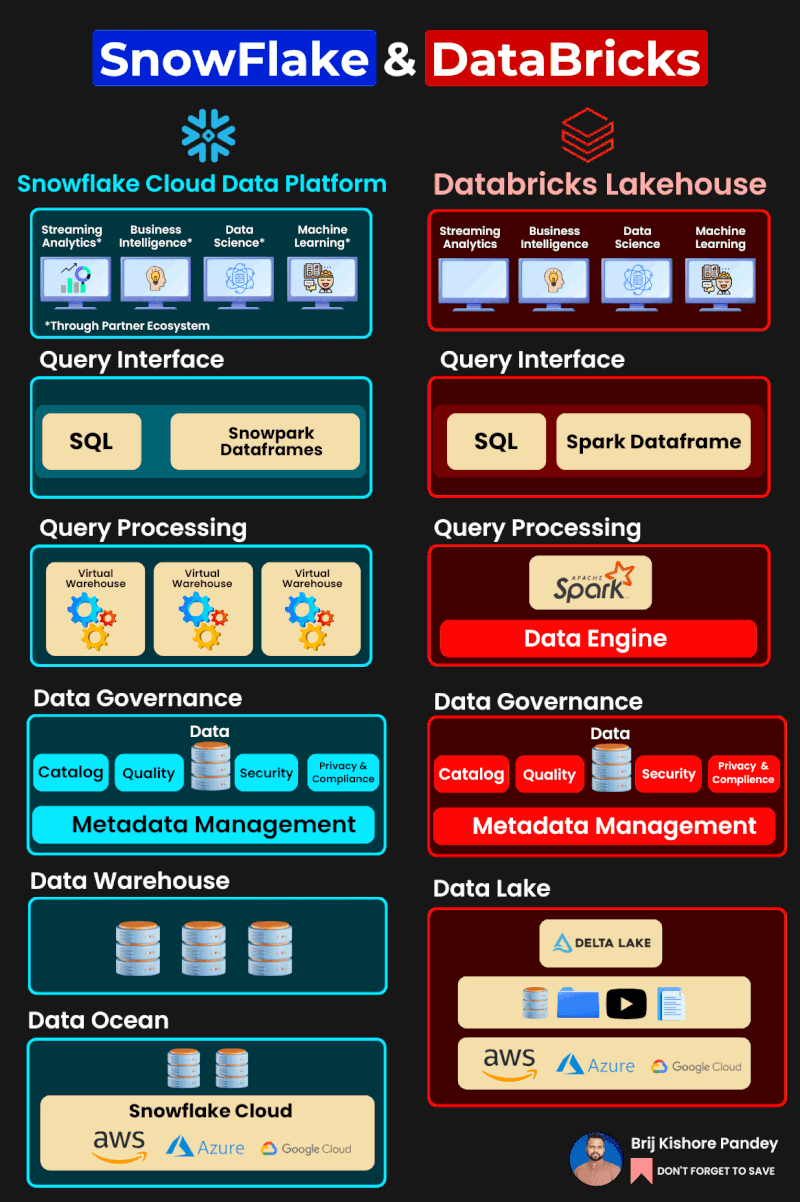
Snowflake and Databricks are two powerful cloud-based platforms, each offering a distinct approach to data processing and analytics. Here’s a comparison highlighting their differences:
- Core Functionality:
- Snowflake: Primarily a cloud data platform providing data warehousing as a service. It’s designed to centralize, store, and run fast SQL queries across large datasets.
- Databricks: A unified analytics platform built around Apache Spark, it provides collaborative notebooks, integrated workflows, and a runtime optimized for the cloud.
- Architecture:
- Snowflake: Uses a unique architecture that separates compute and storage layers. This enables users to scale compute (virtual warehouses) and storage independently, which can lead to cost savings.
- Databricks: Built on Apache Spark, it inherently leverages Spark’s in-memory processing capabilities, distributed computing, and its wide array of supported data processing tasks (batch, real-time, machine learning, etc.).
- Data Integration:
- Snowflake: Provides native connectors for various ETL tools and integrates with popular BI tools. Snowflake can ingest structured and semi-structured data (like JSON).
- Databricks: Offers a broader set of connectors due to its Spark foundation, supporting various data sources, including but not limited to Hadoop HDFS, Delta Lake, Kafka, and more.
- Performance:
- Snowflake: Achieves fast performance with features like automatic clustering, materialized views, and the separation of compute and storage.
- Databricks: Boosts performance using an optimized version of Apache Spark. Databricks also introduced Delta Lake, which brings ACID transactions to data lakes and improves read and write operations’ speed.
- Pricing:
- Snowflake: You’re primarily charged for the amount of compute (virtual warehouses) you use and the storage consumed.
- Databricks: Charges are generally based on the virtual machines you use for computations and any additional premium features or support levels.
- Usability:
- Snowflake: SQL-based interface makes it friendly for those familiar with SQL. The web interface allows for easy management and query execution.
- Databricks: Offers collaborative notebooks, making it easier for teams to work together on analytics and machine learning tasks.
- Machine Learning:
- Snowflake: Not inherently a machine learning platform, but it integrates with various ML platforms and tools.
- Databricks: Has built-in capabilities for machine learning. The collaborative notebooks support multiple languages, including Python, which allows the easy use of libraries like TensorFlow and PyTorch.
- Ecosystem & Community:
- Snowflake: Growing rapidly and has strong integrations with major cloud providers and various tech partners.
- Databricks: Rooted in the Apache Spark community, it has a vast ecosystem. Moreover, its initiatives like Delta Lake are further expanding its community reach.
- Security:
- Snowflake: Provides features like end-to-end encryption, multi-factor authentication, and role-based access control.
- Databricks: Offers encryption at rest and in transit, role-based access control, and integration with enterprise security tools.
I’m a DevOps/SRE/DevSecOps/Cloud Expert passionate about sharing knowledge and experiences. I am working at Cotocus. I blog tech insights at DevOps School, travel stories at Holiday Landmark, stock market tips at Stocks Mantra, health and fitness guidance at My Medic Plus, product reviews at I reviewed , and SEO strategies at Wizbrand.
Please find my social handles as below;
Rajesh Kumar Personal Website
Rajesh Kumar at YOUTUBE
Rajesh Kumar at INSTAGRAM
Rajesh Kumar at X
Rajesh Kumar at FACEBOOK
Rajesh Kumar at LINKEDIN
Rajesh Kumar at PINTEREST
Rajesh Kumar at QUORA
Rajesh Kumar at WIZBRAND

 Starting: 1st of Every Month
Starting: 1st of Every Month  +91 8409492687
+91 8409492687  Contact@DevOpsSchool.com
Contact@DevOpsSchool.com
